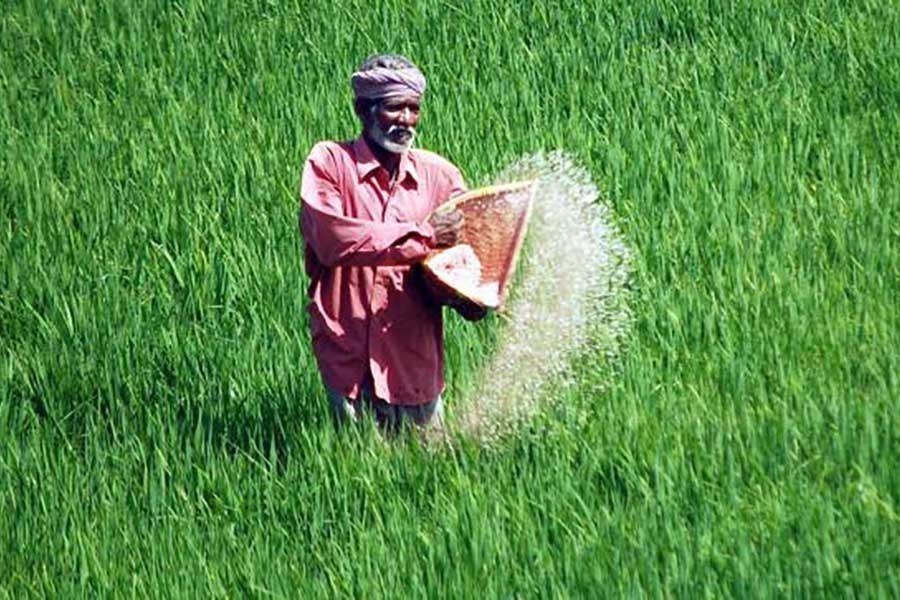
Published :
Updated :

The government is set to cut fertiliser usage for the upcoming financial year (FY23) following its skyrocketing prices in the global market.
The Department of Agriculture Extension (DAE) under the Ministry of Agriculture primarily has set a requirement for 6.4 million tonnes of fertiliser for the upcoming financial year which was 6.56 million tonnes in the outgoing financial year, said an official of the DAE.
Though the prices of fertilisers have increased by 80-200 per cent across the globe in a year, the government here has decided to keep the existing retail prices of the input for the farmers, he said.
Meanwhile, officials of the agriculture ministry and the industries ministry told the FE that the country now had a stock of 1.45 million tonnes of fertilisers, including urea and non-urea, which is enough to meet the local demand for the upcoming Aman and the ongoing summer vegetable seasons.
In the outgoing fiscal year, the DAE had set a requirement for 2.6 million tonnes urea, 1.65 million tonnes of DAP, 0.75 million tonnes of MOP, 0.7 million tonnes of TSP, 0.55 million tonnes of gypsum, 0.141 million tonnes of zinc sulfate and 0.178 million tonnes of other fertilisers.
For the last one decade, the DAE has been raising the requirement by 4.0-5.0 per cent year-on-year basis.
"The next fiscal year is going to be an exception as we have calculated the requirement as 6.4 million tonnes," the DAE official told the FE.
The usage of DAP fertiliser might see a cut mostly, while requisition for other fertilisers will remain the same like the last year's, he explained.
The officials concerned have been asked to work with farmers in order to prevent unnecessary use of the fertilisers, especially urea, he said.
Additional Secretary of the agriculture ministry Balai Krishna Hazra told the FE that after completion of the last Aman, potato, Rabi vegetable and ongoing boro season, the country still had enough fertiliser stocks to meet the demand until next potato season.
The country has a stock of 0.395 million tonnes of DAP, 0.285 million tonnes of MOP and 0.215 million tonnes of TSP, he said, adding that a notable volume would also enter the country under contracts signed in the outgoing financial year.
And imports for next fiscal year will also start from July which could raise availability of fertilisers further, he noted.
Prices of fertiliser will remain the same as the government puts top priority on high production growth of food crops following the global surge in commodity prices which hit a 14-year high, added the secretary.
Asked, an official concerned of the Bangladesh Chemical Industries Corporation told the FE that the country had imported 1.59 million tonnes of urea this fiscal year so far, while local factories had produced 0.85 million tonnes during the same period.
He said they still had a stock of 0.55 million tonnes of urea, while 0.12 million tonnes are in the import pipeline.
Local factories could also supply another 0.1 million tonnes within June, he added.
Executive Director of the Economic Development Research Organisation Md Tanjil Hossain said ensuring a smooth supply of fertilisers was going to be the key challenge for the government in the next financial year.
He said fertiliser prices increased by 80-200 per cent as urea price surpassed $950 a tonne in May while DAP $1,000 a tonne.
MOP price hit $560 a tonne amid the Russia-Ukraine war which was a maximum $205 a tonne in May 2021, said Mr Hossain.
Apart from ensuring required imports, he said, the government should also strictly monitor the non-economic factors like syndication which was observed in the Boro season as farmers had to buy urea at Tk 20-22 a kg against the government-set price of Tk 16.
He said farmers also had to spend additional Tk 5.0-10 a kg to source TSP, DAP, Zinc sulfate, MOP in the boro season, thus raising the production costs.
The government should ensure that farmers get fertilisers at official rates in the Aman season, he added.
tonmoy.wardad@gmail.com


 For all latest news, follow The Financial Express Google News channel.
For all latest news, follow The Financial Express Google News channel.